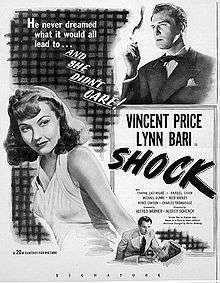Shock (1946 film)
| Shock | |
|---|---|
 Theatrical release poster | |
| Directed by | Alfred L. Werker |
| Produced by | Aubrey Schenck |
| Screenplay by |
|
| Story by | Albert DeMond |
| Starring | |
| Music by | David Buttolph |
| Cinematography | |
| Edited by | Harmon Jones |
Production company |
20th Century Fox |
| Distributed by | 20th Century Fox |
Release dates |
|
Running time | 70 minutes |
| Country | United States |
| Language | English |
| Budget | $350,000[1] |
| Box office | $800,000[2] |
Shock is a 1946 American film noir directed by Alfred L. Werker starring Vincent Price, Lynn Bari and Frank Latimore.[3]
Plot
The film tells the story of a psychiatrist, Dr. Cross (Vincent Price), who is treating a young woman, Janet Stewart (Anabel Shaw), who is in a coma-state, brought on when she heard loud arguing, went to her window and saw a man strike his wife with a candlestick and kill her. It also stars Lynn Bari as Dr. Cross's nurse/lover, Elaine Jordan.
As Stewart comes out of her shock, she recognizes Dr. Cross as the killer. He then takes her to his sanitarium and at Elaine's urging, gives Janet an overdose of insulin under the pretense of administering insulin shock therapy. He can't bring himself to murder her in cold blood, though, and asks Elaine to get the medicine to save her. Elaine refuses, they argue, and he strangles her. A colleague of Dr. Cross, Dr. Harvey, saves Janet's life and Dr. Cross is taken into custody by a lawyer from the District Attorney's office.
Cast
- Vincent Price as Dr. Richard Cross
- Lynn Bari as Elaine Jordan
- Frank Latimore as Lt. Paul Stewart
- Anabel Shaw as Janet Stewart
- Stephen Dunne as Dr. Stevens
- Reed Hadley as O'Neill
- Renee Carson as Mrs. Hatfield
- Charles Trowbridge as Dr. Franklin Harvey
Production
The film was originally to be directed by Henry Hathaway.[1]
Reception
Above and beyond the typical characteristics of the horror film genre, reviewer Bosley Crowther of The New York Times took particular offense to the film's treatment of Price as a psychiatrist who attempts to do away with his patient, a woman who has lost her mind after witnessing the murder her own doctor had committed. Coming in the wake of World War II, in which so may people had suffered shock and could benefit from treatment of their anxieties, Crowther asked the "critical observer to protest in no uncertain tones" the movie's "social disservice" in its fostering "apprehension against the treatment of nervous disorders", deploring the lack of consideration for those in need of treatment evidenced by producer Aubrey Schenck and distributor Twentieth Century-Fox.[4] Philip K. Scheuer of the Los Angeles Times took no such offense, calling the film a "nominal 'B' feature", which screenplay author "Eugene Ling and Director Alfred Werker have imbued... with a grade-A suspense".[5] Jonathan Malcolm Lampley wrote in Women in the Horror Films of Vincent Price that his role in this film "foreshadows the mad doctors and scientists Price would frequently portray in his later career".[6]
See also
References
- 1 2 Tom Weaver, It Came from Horrorwood: Interviews with Moviemakers in the SF and Horror Tradition McFarland, 2000 p 271
- ↑ Aubrey Solomon, Twentieth Century-Fox: A Corporate and Financial History Rowman & Littlefield, 2002 p 221
- ↑ Shock at the American Film Institute Catalog.
- ↑ Crowther, Bosley. "The Screen; Bad Medicine", The New York Times, March 9, 1946. Accessed July 2, 2009.
- ↑ Scheuer, Philip K. "'Shock' Joins Procession of 'Psychos'", Los Angeles Times, March 7, 1946. Accessed July 2, 2009.
- ↑ Lampley, Jonathan Malcolm (2010). Women in the Horror Films of Vincent Price. McFarland & Company. p. 17. ISBN 9780786457496.
External links
| Wikiquote has quotations related to: Shock (1946 film) |
- Shock at the American Film Institute Catalog
- Shock at the Internet Movie Database
- Shock at AllMovie
- Shock at the TCM Movie Database
- Shock is available for free download at the Internet Archive